We Thought We Were a Hovercraft, But We Got Stuck In The Mud is a documentation workshop and co-created live research site taking place at Monitor Lizard House (Talat Noi), as part of a larger program to build new knowledge about Samut Prakan and Samut Sakhon, the estuary in southern Bangkok.
Developed as part of A House In Many Parts festival, in collaboration with Eduardo Cassina, Patrick Donbeck and Tijn van de Wijdeven. Curated by Abhijan Toto (Forest Curriculum). In partnership with Goethe Institute Thailand and Alliance Française Bangkok
Expanding over an area larger than the city of Bangkok itself, these wetlands mirror global land conditions -tranquilized by real estate, agricultural/farming, and touristic/cultural imperatives, yet accelerated by climate change and unstable terraforming weather patterns. Affected by significant coastal erosion over the past few decades, as well as subject to increasing seawater levels, Samut Prakan and Samut Sakhon provide us with a framework to reimagine this liminal shore at various scales, as well as to learn from it.As pluvial floods intensify over the years, and buildings further sink into the soil, Bangkok is witnessing temporal ‘shore’ circumstances whilst losing ‘firm ground’ in different parts of the city; slowly returning into its marshland primogenial condition. This amphibian urban condition, which the city is not yet ready for, is something that can be learned from in the wetlands of Samut Prakan and Samut Sakhon; where the further south you go, the effects of the lunar, tidal and erosive cycles become more apparent in the landscape.
During the workshop, participants will be introduced to a series of methods to represent their research through videos, live-streams, zine-publishing, photography, and other documentation.After an initial collective journey to ‘meet the shore’, we will be using Monitor Lizard House as a reconstructed live research site, providing new ground to build imaginary/knowledge about the wetlands. The workshop will culminate with a small pop-up exhibition on the last day, where the results gathered during our intensive research will be displayed. What are the socio-geological dynamics that are related to and/or shape wetland-events? Can a new context escape the idea of “climate adaptation” bluntly present in ideas, for example, of moving the city elsewhere, and instead look towards climate co-production?Focusing on channeling, tracing, modeling, linking, collecting, archiving - We Thought We Were a Hovercraft, But We Got Stuck In The Mud introduces different scales to construct a collective archive that is unfolding the network behind the wetland - a hyperobject in progress that serves as a new context for discussing the future of Bangkok.
Developed as part of A House In Many Parts festival, in collaboration with Eduardo Cassina, Patrick Donbeck and Tijn van de Wijdeven. Curated by Abhijan Toto (Forest Curriculum). In partnership with Goethe Institute Thailand and Alliance Française Bangkok
Expanding over an area larger than the city of Bangkok itself, these wetlands mirror global land conditions -tranquilized by real estate, agricultural/farming, and touristic/cultural imperatives, yet accelerated by climate change and unstable terraforming weather patterns. Affected by significant coastal erosion over the past few decades, as well as subject to increasing seawater levels, Samut Prakan and Samut Sakhon provide us with a framework to reimagine this liminal shore at various scales, as well as to learn from it.As pluvial floods intensify over the years, and buildings further sink into the soil, Bangkok is witnessing temporal ‘shore’ circumstances whilst losing ‘firm ground’ in different parts of the city; slowly returning into its marshland primogenial condition. This amphibian urban condition, which the city is not yet ready for, is something that can be learned from in the wetlands of Samut Prakan and Samut Sakhon; where the further south you go, the effects of the lunar, tidal and erosive cycles become more apparent in the landscape.
During the workshop, participants will be introduced to a series of methods to represent their research through videos, live-streams, zine-publishing, photography, and other documentation.After an initial collective journey to ‘meet the shore’, we will be using Monitor Lizard House as a reconstructed live research site, providing new ground to build imaginary/knowledge about the wetlands. The workshop will culminate with a small pop-up exhibition on the last day, where the results gathered during our intensive research will be displayed. What are the socio-geological dynamics that are related to and/or shape wetland-events? Can a new context escape the idea of “climate adaptation” bluntly present in ideas, for example, of moving the city elsewhere, and instead look towards climate co-production?Focusing on channeling, tracing, modeling, linking, collecting, archiving - We Thought We Were a Hovercraft, But We Got Stuck In The Mud introduces different scales to construct a collective archive that is unfolding the network behind the wetland - a hyperobject in progress that serves as a new context for discussing the future of Bangkok.











